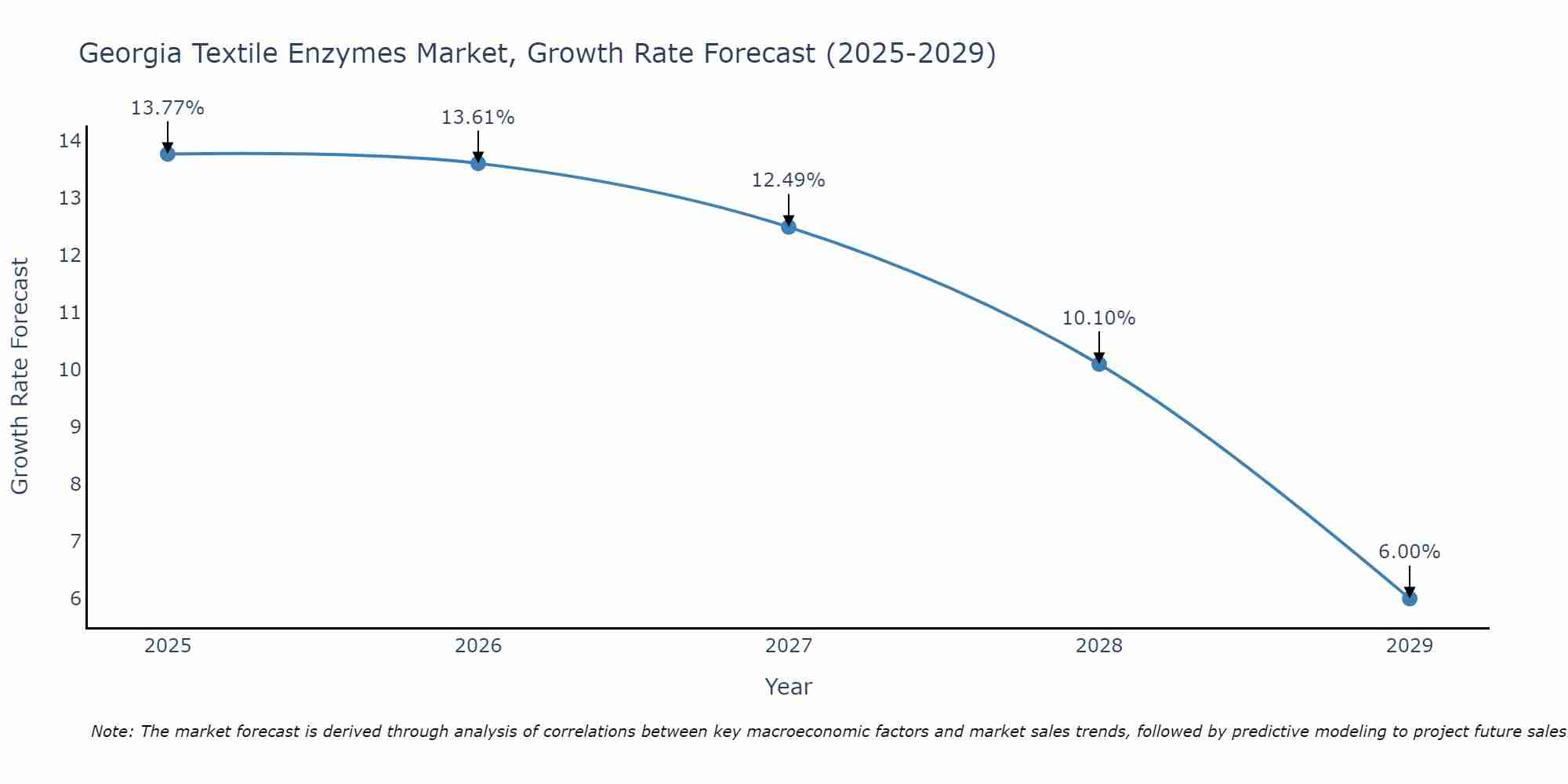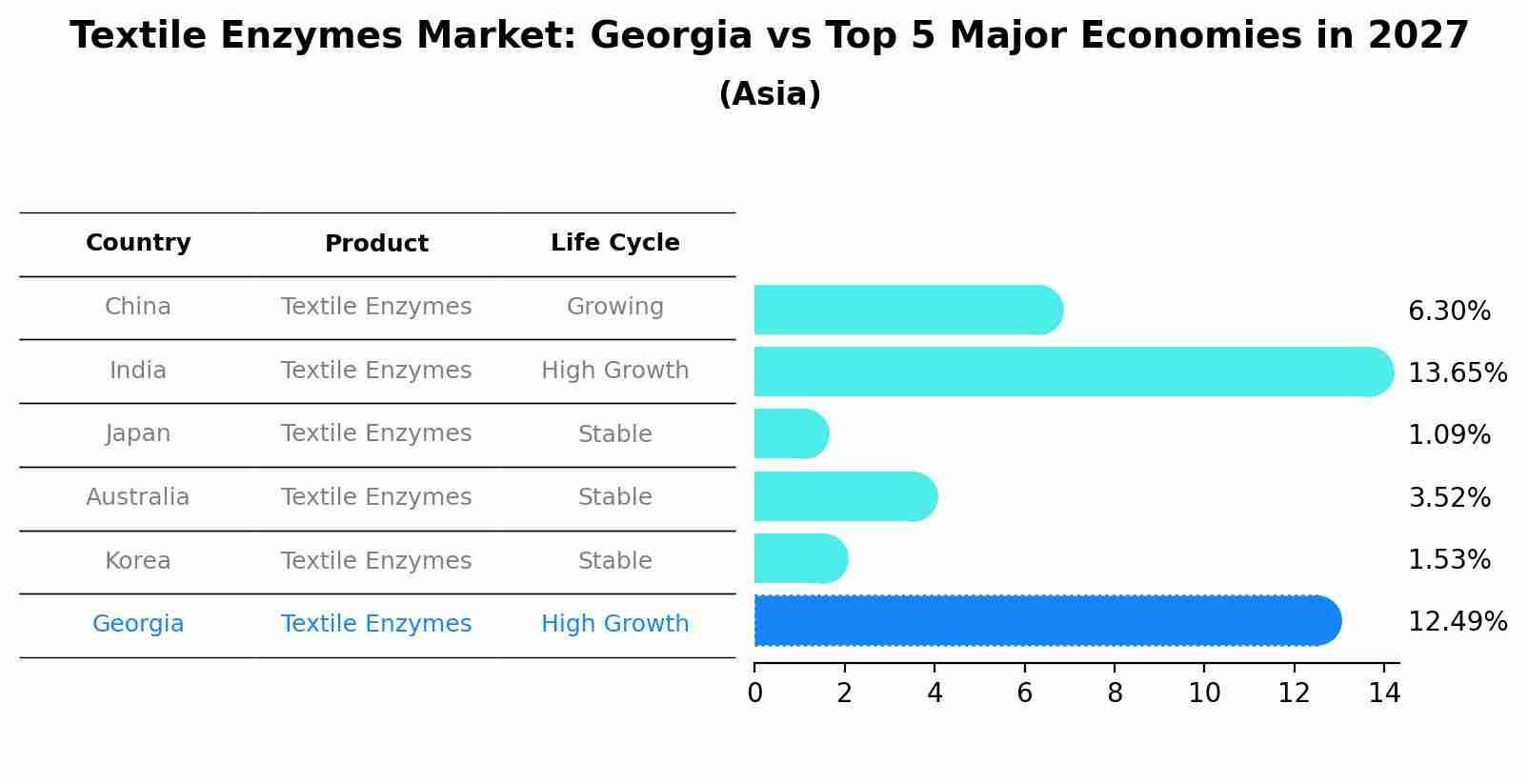Georgia Textile Enzymes Market Outlook | COVID-19 IMPACT, Forecast, Analysis, Growth, Revenue, Value, Trends, Companies, Share, Size & Industry
| Product Code: ETC094099 | Publication Date: Jun 2021 | Updated Date: Jun 2025 | Product Type: Report | |
| Publisher: 6Wresearch | Author: Ravi Bhandari | No. of Pages: 70 | No. of Figures: 35 | No. of Tables: 5 |
Georgia Textile Enzymes Market Size Growth Rate
The Georgia Textile Enzymes Market may undergo a gradual slowdown in growth rates between 2025 and 2029. Starting high at 13.77% in 2025, the market steadily declines to 6.00% by 2029.

Textile Enzymes Market: Georgia vs Top 5 Major Economies in 2027 (Asia)
In the Asia region, the Textile Enzymes market in Georgia is projected to expand at a high growth rate of 12.49% by 2027. The largest economy is China, followed by India, Japan, Australia and South Korea.

Georgia Textile Enzymes Market Overview
The Georgia Textile Enzymes Market is experiencing steady growth driven by increasing demand for sustainable textile processing solutions. Enzymes play a crucial role in various stages of textile manufacturing, including desizing, bio-polishing, and finishing processes. The market is witnessing a shift towards eco-friendly and cost-effective enzyme-based solutions to achieve desired fabric characteristics and reduce water and energy consumption. Key market players are focusing on developing innovative enzyme products tailored to the specific requirements of the textile industry in Georgia. The market is characterized by intense competition, leading to continuous product advancements and strategic collaborations to expand market reach. With the growing emphasis on sustainable practices in the textile sector, the Georgia Textile Enzymes Market is poised for further expansion in the coming years.
Georgia Textile Enzymes Market Trends
The Georgia Textile Enzymes Market is witnessing several key trends currently. One notable trend is the increasing demand for eco-friendly and sustainable enzyme solutions in textile manufacturing processes. This shift towards sustainability is driving textile companies in Georgia to adopt enzyme technologies that are biodegradable and reduce the environmental impact of their operations. Another trend is the growing preference for enzyme solutions that offer enhanced efficiency and cost-effectiveness in processes such as desizing, bio-polishing, and denim finishing. Additionally, there is a rising focus on research and development activities to introduce innovative enzyme formulations tailored to specific textile applications, further driving market growth in the region. Overall, these trends indicate a significant shift towards sustainable practices and advanced enzyme technologies in the Georgia Textile Enzymes Market.
Georgia Textile Enzymes Market Challenges
In the Georgia Textile Enzymes Market, some of the key challenges faced include increasing competition from international enzyme manufacturers, fluctuating raw material costs, stringent environmental regulations, and the need for continuous innovation to meet changing consumer demands. The market also faces issues related to technology advancement and the adoption of sustainable practices in enzyme production. Additionally, ensuring consistent quality and performance of enzymes in textile processing applications poses a challenge for industry players. To stay competitive and address these challenges, companies in the Georgia Textile Enzymes Market need to invest in research and development, strengthen supply chain management, enhance sustainability practices, and focus on differentiation strategies to meet the evolving needs of textile manufacturers and consumers.
Georgia Textile Enzymes Market Investment Opportunities
The Georgia textile enzymes market presents promising investment opportunities due to the growing demand for eco-friendly and sustainable textile production processes. Enzymes are increasingly used in the textile industry to improve the efficiency of various processes such as desizing, bio-polishing, and denim finishing. Investing in enzyme manufacturers or suppliers in Georgia can be lucrative as the market continues to expand. Additionally, the focus on reducing water and energy consumption in textile production further drives the demand for enzymes, making it a strategic investment choice. With the textile industry in Georgia showing steady growth and a shift towards sustainable practices, investing in the textile enzymes market in the region can offer long-term growth potential and attractive returns for investors.
Georgia Textile Enzymes Market Government Policy
The Georgia Textile Enzymes Market is subject to various government policies aimed at regulating the use of enzymes in textile production. These policies typically focus on environmental protection, worker safety, and product quality. The government may require textile manufacturers to adhere to specific guidelines regarding the use of enzymes, such as ensuring proper disposal methods to minimize environmental impact and enforcing safety measures to protect workers from exposure to potentially harmful substances. Additionally, regulations may be in place to ensure that textile products meet certain quality standards before being released into the market. Overall, government policies play a crucial role in shaping the practices and standards within the Georgia Textile Enzymes Market to promote sustainability, safety, and quality in textile production.
Georgia Textile Enzymes Market Future Outlook
The future outlook for the Georgia Textile Enzymes Market appears promising, driven by increasing demand for eco-friendly and sustainable textile processing solutions. Enzymes are gaining popularity in the textile industry due to their ability to reduce water and energy consumption, lower chemical usage, and improve process efficiency. With a growing emphasis on environmental regulations and consumer awareness towards sustainable products, the adoption of textile enzymes is expected to rise in Georgia. Manufacturers are likely to focus on developing innovative enzyme products tailored to meet specific textile processing requirements, further fueling market growth. Additionally, collaborations between key industry players, research institutions, and government initiatives aimed at promoting sustainable practices are anticipated to support the expansion of the Georgia Textile Enzymes Market in the coming years.
Key Highlights of the Report:
- Georgia Textile Enzymes Market Outlook
- Market Size of Georgia Textile Enzymes Market, 2021
- Forecast of Georgia Textile Enzymes Market, 2027
- Historical Data and Forecast of Georgia Textile Enzymes Revenues & Volume for the Period 2018 - 2027
- Georgia Textile Enzymes Market Trend Evolution
- Georgia Textile Enzymes Market Drivers and Challenges
- Georgia Textile Enzymes Price Trends
- Georgia Textile Enzymes Porter's Five Forces
- Georgia Textile Enzymes Industry Life Cycle
- Historical Data and Forecast of Georgia Textile Enzymes Market Revenues & Volume By Type for the Period 2018 - 2027
- Historical Data and Forecast of Georgia Textile Enzymes Market Revenues & Volume By Cellulase for the Period 2018 - 2027
- Historical Data and Forecast of Georgia Textile Enzymes Market Revenues & Volume By Amylase for the Period 2018 - 2027
- Historical Data and Forecast of Georgia Textile Enzymes Market Revenues & Volume By Catalase for the Period 2018 - 2027
- Historical Data and Forecast of Georgia Textile Enzymes Market Revenues & Volume By Pectinase for the Period 2018 - 2027
- Historical Data and Forecast of Georgia Textile Enzymes Market Revenues & Volume By Laccase for the Period 2018 - 2027
- Historical Data and Forecast of Georgia Textile Enzymes Market Revenues & Volume By Others for the Period 2018 - 2027
- Historical Data and Forecast of Georgia Textile Enzymes Market Revenues & Volume By Application for the Period 2018 - 2027
- Historical Data and Forecast of Georgia Textile Enzymes Market Revenues & Volume By Bio-polishing for the Period 2018 - 2027
- Historical Data and Forecast of Georgia Textile Enzymes Market Revenues & Volume By Desizing for the Period 2018 - 2027
- Historical Data and Forecast of Georgia Textile Enzymes Market Revenues & Volume By Enzymatic Bleaching for the Period 2018 - 2027
- Historical Data and Forecast of Georgia Textile Enzymes Market Revenues & Volume By Bioscouring for the Period 2018 - 2027
- Historical Data and Forecast of Georgia Textile Enzymes Market Revenues & Volume By Others for the Period 2018 - 2027
- Georgia Textile Enzymes Import Export Trade Statistics
- Market Opportunity Assessment By Type
- Market Opportunity Assessment By Application
- Georgia Textile Enzymes Top Companies Market Share
- Georgia Textile Enzymes Competitive Benchmarking By Technical and Operational Parameters
- Georgia Textile Enzymes Company Profiles
- Georgia Textile Enzymes Key Strategic Recommendations
Frequently Asked Questions About the Market Study (FAQs):
- Single User License$ 1,995
- Department License$ 2,400
- Site License$ 3,120
- Global License$ 3,795
Search
Thought Leadership and Analyst Meet
Our Clients
Related Reports
- Afghanistan Apparel Market (2026-2032) | Growth, Outlook, Industry, Segmentation, Forecast, Size, Companies, Trends, Value, Share, Analysis & Revenue
- Canada Oil and Gas Market (2026-2032) | Share, Segmentation, Value, Industry, Trends, Forecast, Analysis, Size & Revenue, Growth, Competitive Landscape, Outlook, Companies
- Germany Breakfast Food Market (2026-2032) | Industry, Share, Growth, Size, Companies, Value, Analysis, Revenue, Trends, Forecast & Outlook
- Australia Briquette Market (2025-2031) | Growth, Size, Revenue, Forecast, Analysis, Trends, Value, Share, Industry & Companies
- Vietnam System Integrator Market (2025-2031) | Size, Companies, Analysis, Industry, Value, Forecast, Growth, Trends, Revenue & Share
- ASEAN and Thailand Brain Health Supplements Market (2025-2031) | Strategy, Consumer Insights, Analysis, Investment Trends, Opportunities, Growth, Size, Share, Industry, Revenue, Segments, Value, Segmentation, Supply, Forecast, Restraints, Outlook, Competition, Drivers, Trends, Demand, Pricing Analysis, Competitive, Strategic Insights, Companies, Challenges
- ASEAN Bearings Market (2025-2031) | Strategy, Consumer Insights, Analysis, Investment Trends, Opportunities, Growth, Size, Share, Industry, Revenue, Segments, Value, Segmentation, Supply, Forecast, Restraints, Outlook, Competition, Drivers, Trends, Demand, Pricing Analysis, Competitive, Strategic Insights, Companies, Challenges
- Europe Flooring Market (2025-2031) | Outlook, Share, Industry, Trends, Forecast, Companies, Revenue, Size, Analysis, Growth & Value
- Saudi Arabia Manlift Market (2025-2031) | Outlook, Size, Growth, Trends, Companies, Industry, Revenue, Value, Share, Forecast & Analysis
- Uganda Excavator, Crane, and Wheel Loaders Market (2025-2031) | Strategy, Consumer Insights, Analysis, Investment Trends, Opportunities, Growth, Size, Share, Industry, Revenue, Segments, Value, Segmentation, Supply, Forecast, Restraints, Outlook, Competition, Drivers, Trends, Demand, Pricing Analysis, Competitive, Strategic Insights, Companies, Challenges
Industry Events and Analyst Meet
Whitepaper
- Middle East & Africa Commercial Security Market Click here to view more.
- Middle East & Africa Fire Safety Systems & Equipment Market Click here to view more.
- GCC Drone Market Click here to view more.
- Middle East Lighting Fixture Market Click here to view more.
- GCC Physical & Perimeter Security Market Click here to view more.
6WResearch In News
- Doha a strategic location for EV manufacturing hub: IPA Qatar
- Demand for luxury TVs surging in the GCC, says Samsung
- Empowering Growth: The Thriving Journey of Bangladesh’s Cable Industry
- Demand for luxury TVs surging in the GCC, says Samsung
- Video call with a traditional healer? Once unthinkable, it’s now common in South Africa
- Intelligent Buildings To Smooth GCC’s Path To Net Zero


















